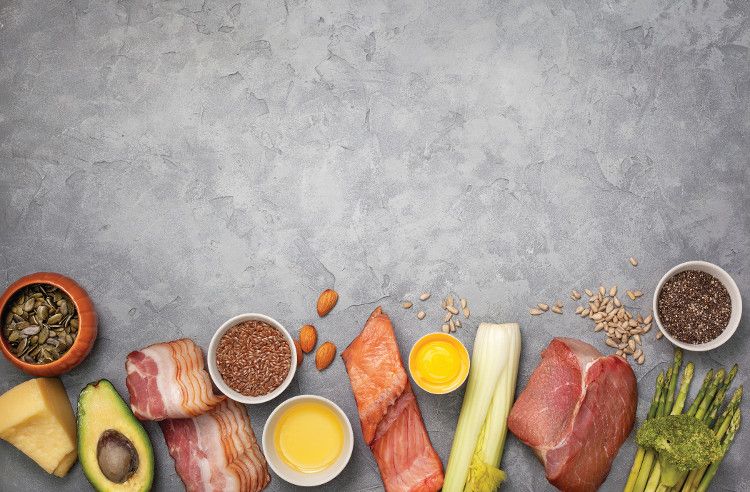How ketogenic is trending in foods and supplements
Keto products are diversifying from the sports nutrition category into all manner of food and beverage products.
Photo © AdobeStock.com/natashamam35

The ketogenic diet has come to considerable prominence in recent years, thanks in part to growing adoption among celebrities, media personalities, and professional athletes. Keto is currently the diet of choice of Katie Couric, Halle Berry, LeBron James, and Tim Tebow. Alicia Vikander famously used the keto diet to lose weight and gain muscle in preparation for her role in “Tomb Raider,” and three out of five Kardashians agree that keto is the way to go.
These influencers are going keto for the diet’s energy-boosting and weight-loss health claims, and what originally started as a medical experiment is now a rapidly growing industry full of new opportunities for functional food and nutritional supplement brands. Data provided to Nutritional Outlook by Innova Market Insights show that the number of new food and beverage products with keto claims grew five-fold from 2013 to 2017, with keto products diversifying from the sports nutrition category into all manner of food and beverage products.
Keto now has a strong presence in the functional foods industry, with keto cereal, keto ice cream, keto candy, and even keto chocolate chip cookies coming to market. Innova’s data indicate that ketogenic sports nutrition products now account for just 33% of the market, down from 100% in 2013. As more mainstream consumers adopt the keto diet, expect ketogenic functional foods to continue expanding into more categories and SKUs.
Keto supplements are also growing, with keto diet adherents frequently using exogenous ketones to reduce the impact of the “keto flu” (ill feelings keto adopters sometimes experience at the start of the diet). Exogenous ketones are now available as ketone esters, ketone salts, and ketone oils.
As more consumers adopt the keto diet to meet their functional needs, expect new opportunities to open up in keto foods and supplements. Here are just a few of the emerging trends that brands and manufacturers will want to watch.
The Ketogenic Trend: Medical Diet Gone Mainstream
While William Banting’s December 1863 Letter on Corpulence contained the basic principles of what is now known as keto, the modern ketogenic diet came to the fore in the 1920s. Russell Wilder, MD, was an endocrinologist with the Mayo Clinic leading a team of doctors who were developing a new dietary regimen for epilepsy patients.1 Wilder theorized, and later demonstrated through medical trials, that a high-fat, low-carbohydrate diet mimicked the starvation therapy that, at the time, was the leading remedy for severe childhood epilepsy.2 Researchers and clinicians at Johns Hopkins Medicine later built the Ketogenic Diet Center, a clinical and research department dedicated to managing pediatric epilepsy through the ketogenic diet.3
In recent years, though, the ketogenic diet has moved outside of the medical establishment and into the mainstream consumer nutrition market. Functional foods, in particular, are seeing rapid growth of foods that are said to promote ketosis (when the body burns fat for energy).
The Rise of the Keto Food Movement
Mike Salguero, co-founder and CEO of ButcherBox (Cambridge, MA), says the ketogenic trend is growing within the functional food space. He points to new product trends in the Paleo market as evidence.
“There’s a Paleo conference in Austin, Texas, every year called PaleoFX,” Salguero says. “I’ve been going there for a few years, and over the past year or so, the conference has really changed. Paleo is moving toward keto. I’m not sure if it’s because the ancestral health experts are realizing keto is more in line with what our ancestors used to eat, but we’re definitely seeing [ketogenic food] products like Fat Bomb and Bulletproof Coffee at these Paleo events.”
Salguero says the ketogenic food trend is similar to the Paleo trend in that both diets are about eating more like our ancestors ate. Functional foods, he says, are big in keto. But one new development he’s witnessed is the advent of exogenous ketones: “The notion that you can drink something and put your body into ketosis, or use it for energy if you’re already on a keto diet? That’s new.”
Ketogenic Supplements Address the “Keto Flu”
Thom King, president and CEO of Icon Foods (Portland, OR), says the keto trend has given rise to demand for a new kind of supplement: a supplement that serves as a shortcut to ketosis. The ketogenic diet, King says, requires its adherents to work harder to stay hydrated, especially in the early stages. Switching to a ketogenic diet also places stress on the body as the body learns to stop burning sugar for fuel and start burning fat. For the first several days of a keto diet, dieters commonly report flu-like symptoms for this reason.
“Staying hydrated is critical, and so is making sure you have plenty of electrolytes,” King says. “That’s why there are more and more keto RTDs and drink mix packets that contain sodium chloride, potassium chloride, and other electrolytes. Many consumers are also looking for shortcuts to get them deeper into ketosis. There are exogenous ketone salts like BHB (beta-hydroxybutyrate), but the most effective supplement by far is exogenous ketone esters.”
Ketogenic supplement brands like Perfect Keto (Austin, TX) offer consumers multiple kinds of supplements that claim to ease the keto flu, ranging from ketone salts to esters to oils. Other brands, like Sated (Cambridge, MA), have formulated such ingredients into ketogenic powders and RTD shakes. Sated founder and CEO Ted Tieken says the keto flu is usually the result of one of two potential causes: either the body is resisting the switch to burning fat instead of sugar, which typically lasts for the first four days of a keto diet, or the consumer is suffering from low electrolytes.
“In the first case, there’s not really much you can do,” Tieken says. “In the second case, many keto brands, Sated included, have incorporated electrolytes into their products.”
The keto industry’s future growth may depend on making consumer transitions to keto diets easier. Expect electrolyte-enriched products and keto flu–busting supplements to continue gaining popularity.
The Future of Keto: Into the Mainstream
The ketogenic food trend is seeing rapid growth, King says, and popular innovations like fat bombs, ketogenic jerky, and MCT-enriched coffees are all making keto more accessible for the mainstream consumer. To gain mass-market appeal, though, keto brands will have to be prepared to formulate products that stand out.
“The biggest areas of demand right now are ketogenic cereals, condiments, and baked goods,” King explains. “The RTD and powdered drink mix markets are starting to get crowded. ‘Keto-heads’ are going to want food they can’t normally eat if they want to stay in ketosis, like breads, pastas, and potatoes.”
King says brands can stand out in the keto space with clean ingredient formulations and innovative product formats. He also expects pre-made keto-friendly meal products to be a lucrative niche, as “ready-to-eat meals will be the next to pop.”
Dorian Greenow is the founder of Keto-Mojo (Napa, CA), a company that manufactures blood ketone monitoring systems. Greenow says standing out in the keto space will require brands to create a quality product and then attract first adopters to it. The keto industry is a bottom-up one, he says, and leveraging grassroots social media can be a particularly effective strategy.
“Keto is a very tight community of advocates, but when they touch something that resonates, it’s magic,” Greenow says. “The classic example is FBomb,” a keto-friendly line of high-fat, low-carb nut butters and oils. “The formula for success is simple: make a quality product and be real about what you’re offering.”
The ketogenic space is full of opportunity for savvy manufacturers and marketers. Brands entering the keto space can easily capitalize on this growing trend by investing in high-quality ingredients, coming up with innovative new product formats, and building strong communities around their products.
Sidebar 1:
Keto Wearables: An Emerging Industry
Mike Salguero, co-founder and CEO of ButcherBox, says that tools for tracking and monitoring ketone concentrations is one of the areas where the next major opportunities in keto will arise. Keto dieters tend to move in and out of ketosis, and maintaining the benefits of the ketogenic diet will require these consumers to be able to track blood ketone levels.
“The die-hard ketogenic people say that the only way you know you’re in ketosis is by taking your blood,” Salguero says. “That’s out of the Tim Ferriss [author and podcast host] school of thought where, if you’re going to be on a ketogenic diet, you can’t just eat fat and hope for the best. I think there’s going to be more of this, because more and more people are getting into the biohacking and wearables trends.”
Sidebar 2:
Keto Studies: The Good, the Bad, and the Methodologically Flawed
Dorian Greenow, founder of Keto-Mojo, says one of the threats facing the keto industry is junk science. He says that poorly controlled research on the ketogenic diet has given rise to conflicting conclusions.
“There was a recent study in The Lancet that got pushed out by the Harvard Business Review that said people on a low-carb diet are more likely to die,” Greenow says. “But if you actually read the study, the people who were more likely to die were smokers who were consuming a standard amount of carbs.”
The prospective observational cohort study Greenow references shows that people on low-carb diets are more likely to have a higher BMI, exercise less, smoke more, and have diabetes than those on a high-carb diet. However, as this was an observational study and not a clinical trial, one cannot rule out confounding variables or the directionality problem.4
Further and better-controlled research on additional potential applications of the ketogenic diet is needed. Early clinical trials on undersea divers have shown promising evidence that the ketogenic diet may have neuroprotective properties.5 The United States Department of Defense and Duke University are now conducting a randomized blind crossover clinical trial examining the effects of nutritional ketosis on oxygen toxicity in underwater conditions.6
Sidebar 3:
What Don't We Know about Keto?
The ketogenic diet may have originated within the medical establishment, but there’s still a lot we don’t know about it. Animal studies have shown that the keto diet can reduce brain inflammation and extend lifespan in mice with brain injuries.7 Outside of seizure prevention, though, it’s unknown what long-term effects keto may have in humans. The ketogenic diet is thought to have neuroprotective and anti-inflammatory properties due to its success as a remedy for pediatric epilepsy in the 1920s; however, modern clinical trials on healthy human subjects are few and far between.8 Additionally, the relationship between the ketogenic diet and major side effects like cardiomyopathy is still unknown.9 Further clinical research is needed to determine whether the ketogenic diet is safe for healthy adults as a standard long-term dietary practice.
References:
- “Classic Keto.” The Charlie Foundation for Ketogenic Therapies. Accessed online October 2, 2018.
- Freeman JM. “Epilepsy’s big fat answer.” Cerebrum (March 2013). Published online March 1, 2013.
- “The Ketogenic Diet Center.” Johns Hopkins Medicine. Accessed online October 2, 2018.
- Seidelmann SB et al. “Dietary carbohydrate intake and mortality: a prospective cohort study and meta-analysis.” The Lancet: Public Health, vol. 3, no. 9 (September 2018): E419-E428
- Bosco G et al. “Effects of the ketogenic diet in overweight divers breathing enriched air nitrox.” Nature Scientific Reports, vol. 8 no. 1 (February 2018): 1-8
- Derrick B et al. “Ketogenic diet for reduction of CNS oxygen toxicity in working divers.” NIH Clinical Trial #NCT03433261.
- Shen Y et al. “Bioenergetic state regulates innate inflammatory responses through the transcriptional co-repressor CtBP.” Nature Communications, vol. 8 no. 1 (September 2017): 624-636
- Stein V. “As the keto diet gains popularity, scientists explain what we do and don’t know.” University of California San Francisco. Published online August 30, 2018.
- Hartman A et al. “Clinical aspects of the ketogenic diet.” Epilepsia, vol. 48 no. 1 (January 2007): 31-42

Prinova acquires Aplinova to further increase its footprint in Latin America
April 7th 2025Prinova has recently announced the acquisition of Brazilian ingredients distributor Aplinova, which is a provider of specialty ingredients for a range of market segments that include food, beverage, supplements, and personal care.



















